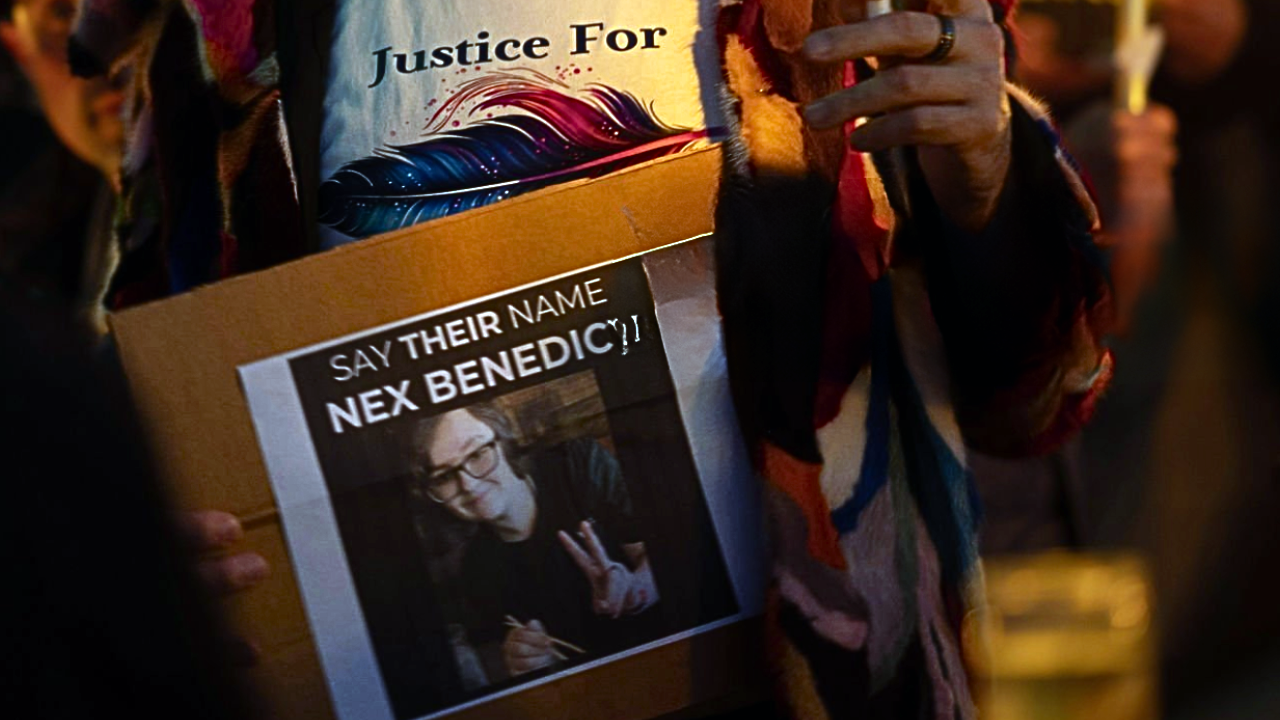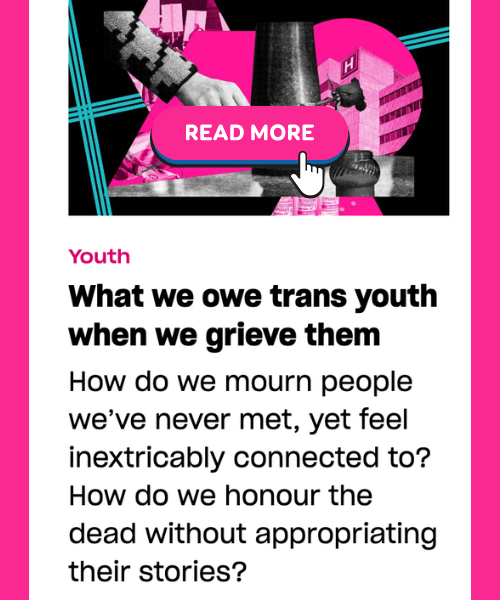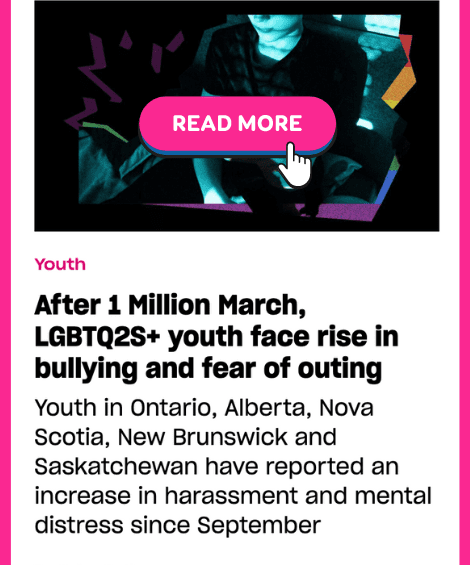Content warning: This story discusses suicide, suicidal ideation and violence against LGBTQ2S+ people. If you are struggling with thoughts of suicide, suicidal ideation or concerned about someone, the Canadian Suicide Prevention Service recommends calling/texting 988 or contacting Kids Help Phone at 1-800-668-6868 or by texting CONNECT. Indigenous people are advised to call the Hope for Wellness Helpline at 1-855-242-3310. Click here for a list of LGBTQ2S+-specific resources.
Since Nex Benedict’s story first made headlines in February, LGBTQ2S+ people around the world have been grappling with the tragedy’s aftermath. Benedict, a trans student in Oklahoma, died one day after being attacked by three female classmates in the girls’ bathroom at Owasso High School. The 16-year-old’s death was ultimately declared a suicide by the state medical examiner’s office, although those findings have been met with criticism from advocacy organizations like GLAAD and Freedom Oklahoma. An independent investigation remains ongoing.
The coverage of Benedict’s case hit at a particularly vulnerable time for LGBTQ2S+ youth in Canada. Provincial leaders have begun pushing policies that strip away rights and protections for trans youth, including their ability to be recognized as their full identities in school. In just one example, New Brunswick implemented rule changes in July 2023 that, in effect, allow teachers to misgender and deadname trans and non-binary students under the age of 16.
Sonny Cantalini, program coordinator for It Gets Better Canada, says many of the LGBTQ2S+ students they work with face “so much hate and discrimination and bullying” in their school environments, partially as a result of policies like these.
“In some schools that I go into, there’s a battle happening between the very loving and accepting trans and queer community and some very homophobic and transphobic rhetoric that’s being brought in,” they say. “Every time something comes out in the news that’s negative toward trans people and toward queer people, it’s felt everywhere, and it’s felt in schools.”
LGBTQ2S+ advocates say that Benedict’s story has profoundly impacted the young people they work with, particularly because their death reflects so many of the challenges they face. Amy Mendenhall, the executive director of Home, an LGBTQ2S+ drop-in space in Alberta, cried when they heard about what happened, thinking of all the Two-Spirit youth who seek out their organization for shelter. Benedict, who used he/they pronouns, was Indigenous and a member of the Choctaw nation.
“The number one cause of death for Two-Spirit people is somebody killing us,” Mendenhall says. “Two-Spirit people are continuously targeted and murdered, and this was a child. I weep for the fact that we have lost another kin. We lost another person that would be an elder.”
Xtra spoke with five trans youth about how Benedict’s death has affected them. Each student spoke on the condition that a pseudonym be used to protect their safety and privacy. By and large, they report feeling alone and isolated; many are actively organizing to support other trans youth who may be struggling to make sense of the world, but that work has been made difficult by the complacency they say surrounds them. Every single interviewee says that their schools and wider communities have been silent on the issues facing LGBTQ2s+ people right now, and it feels as if they are mourning in private.
“Grieving it has been basically impossible with everything that’s happening in the world,” one young person says of Benedict’s death. “I wish more people knew and talked about it. People just don’t pay attention as much as they should. People should know, be aware and wake up to the fact that these things can and do happen.”
“People Get Away with It”
After Levi, a 16-year-old student in Saskatchewan, heard about Benedict’s case for the first time, his first thought was that it could have been him. “I struggle with emotional regulation,” he says. “Anger is one of the emotions that is very prominent in my body. It feels like the emotion is underneath my skin, and it can’t come out, no matter what I’m doing. If I’m really angry about something, I’m thrashing out of frustration, but it doesn’t go away.”
Three years ago, Levi attempted to take his own life after his junior high school retaliated against him for making a TikTok video complaining about a teacher who made students feel uncomfortable during gym class. Even though Levi didn’t even use the teacher’s name, he was effectively suspended. His return to school was met with a meeting in the principal’s office in which he was told he would no longer be able to use the men’s bathroom or the gender-neutral restroom at school, in case another student complained. He had to turn in his phone at the beginning of the day and was no longer allowed on school property after the final bell rang. The administration forced him to wait outside at the bus stop for his mother to pick him up, even if it was raining or snowing outside.
After the meeting with his principal, Levi took an overdose of his medication later that night and passed out while attempting to text Kids Help Phone for emergency assistance. He woke up to two police officers in his room and was taken to a nearby hospital, where he would spend the next 12 hours. His experience at school made him feel like no one respected his identity and he wasn’t welcome there, especially given the bullying he had already experienced. Male classmates would shout “Girl!” when they saw him in the halls. Having his bathroom privileges taken away would have been the final straw.
“It would have sucked because it wasn’t where I’m supposed to be,” he says of potentially being forced to use the girls’ bathroom, noting that most of the punishments were dropped after his hospital stay. “It would just feel wrong. For so many people, it would feel like such a small thing, but I’m not meant to be there.”
Levi, who is now in grade 11, no longer attends that school, but he worries about the challenges that other trans youth in Saskatchewan might be facing following a new law requiring permission from parents before students are allowed to use a different set of pronouns or a new name at school. He believes the law—which has been paused by a court ruling—normalizes the treatment to which he was subjected and lets “people get away with it, without any consequences.” He feels as if provincial politicians are using trans people to gain votes from the extreme far-right and that they “don’t actually care about anything other than being in power.”
Following Benedict’s death, Levi has been attending protests and trying to educate others by posting information on Instagram and TikTok. He says that seeing other people organizing and taking action has shown him that he’s “not the only person who cares” about rights and protections for trans youth like himself.
“There are many people who care about this and are actively fighting for the things that I’m fighting for,” he says. “It would be so easy to just ignore all the problems, but then who’s going to fight?”
“Only a Matter of Time”
Hearing about what happened to Benedict broke Francis’s heart because he was in their shoes not long ago. Now 23, Francis was a 16-year-old student in Alberta when photos of them were posted in his high school locker room with the phrase “he/she” written on them. He was in his rugby uniform with his mouth guard in, getting ready to make a tackle during a match. Francis had only been out as trans for a few short months at the time, and they decided to go back into the closet after that incident, thinking the world wasn’t safe for them yet.
“That was really hard because I had to go through female puberty and endure medical intervention to be able to live the life that I want,” he says. “If I had been met with acceptance and support, it would have saved me a lot of grief.”
The spectre of that incident haunted Francis for years. One of the students responsible for spreading the photos went to his same university, and during their first year, she confronted him in the hallway and told him that he needed to “shut up about that happening” or else it would follow her to their new school. “I just felt so scared, even then, that I couldn’t even hold the ground and my own story,” he says. Even today, Francis says he is too scared to play team sports because it would remind him of how it felt to be young and vulnerable, just like Benedict was.
Although he was in high school just a short time ago, Francis thinks things have only gotten scarier for trans people since he graduated, and Benedict’s case is just one example. In January, Alberta premier Danielle Smith unveiled proposed policies limiting gender-affirming medical care for trans youth under the age of 15, forbidding trans women from competing in women’s sports leagues, and requiring parental notification if students over the age of 15 wish to use new names or pronouns. The package of proposals also allows parents to opt out of school lessons that broach the subjects of sexual orientation or gender identity.
Francis says the current hysteria over LGBTQ2S+ equality in Alberta reminds him of the province’s war on rats in the 1950s. “It was decided that rats were too invasive of a species, and this whole big campaign happened to expel all the rats from Alberta,” he says. “I feel treated like a rat right now, it’s being decided that I need to be pushed out of this province.”
Francis says it’s “isolating and frightening” to be a trans person in Alberta right now. With the policies being pushed, he worries that it’s “only a matter of time” until what Benedict experienced happens to a young person in Alberta. “We’re coming to a place now where violence against trans people is becoming more accepted,” he says. “What happens in the U.S. tends to be echoed in Canada, and I’m holding my breath waiting to see who it’s going to be.”
“We Are Living in a Bubble”
When Tori, a 16-year-old student in Ontario, was being bullied in junior high school, their school’s social worker advised them to just ignore it. “You can’t expect everyone to like you,” Tori says the staff member said. Her tormentor was a student in a grade below, who targeted Tori because she was one half of the only queer couple in school. “This guy told me to kill myself, punched me and shoved me into desks,” Tori says. “He did everything to make my life miserable. It felt like he wanted me dead, and I felt very alone.” Even years later, when Tori sees the student walking down the halls, they run the opposite direction.
Although Tori says they can’t relate to the specificities of what Benedict experienced, she does understand what it feels like not to feel heard. And after Benedict’s death, they still feel as if no one is listening. Tori lives in a progressive city where there is a large queer community, but among her circle of friends, she says barely anyone has even brought up Benedict’s name. Even at the local LGBTQ2S+ organization where Tori works as a youth leader, they say few people have broached the subject.
Tori believes the silence around Benedict is the result of several factors, including how difficult the news is to process. When she first heard about the incident on TikTok, Tori was overwhelmed at the conflicting narratives surrounding the case. Some claimed their alleged suicide was completely unrelated to the bathroom attack, while others said Benedict instigated the violence by throwing water on the assailants. But Tori says there’s also a level of denial involved: many of the queer youth in their circles treat homophobia and transphobia as a uniquely American problem, thereby minimizing Canada’s own issues surrounding LGBTQ2S+ equality.
“A lot of queer teens that I know say, ‘We should be thinking of the good stuff,’ but we are not in La-La Land,” Tori says. “We are not living in this gay utopia up in the sky. It’s like we’re living in a bubble, but I’m watching from the outside. I’m shouting at them, ‘Hey, can you identify what’s going on?’ and no one is.”
The reality is, Tori says, that even relatively liberal provinces like Ontario have their own problems. Last year, education minister Stephen Lecce opined that parents “must be fully involved” if a trans student is to be permitted to use new pronouns or a new name at school. Just days after those comments, a group of teenagers burned a Kitchener high school’s Pride flag after tearing it down and stomping on it. (Although Premier Doug Ford has signalled that he won’t follow Alberta’s lead by restricting gender-affirming care, he has accused school boards in Ontario of “indoctrinating” students on issues regarding LGBTQ2S+ equality.)
Tori is working to educate Canadians about the realities that LGBTQ2S+ people face by helping to organize queer advocacy conferences and planning workshops centred on mental health. But following Benedict’s death, they hope to see other members of the LGBTQ2S+ community using this moment as an opportunity for education, and for allies to educate themselves on what the queer people in their lives are going through.
“I feel so angry because it’s not just me that this is happening to,” Tori says. “This is happening to so many other people. No one seems to understand or want to listen.”
“What if I’m Next?”
Taylor, a 18-year-old student in Ontario, was initially confused when he suddenly saw Benedict’s name splashed across his Instagram feed. “Rest in Power, Nex Benedict,” read post after post. Taylor had never heard that name before, and so he googled Benedict, wanting more information about who this mysterious person was. He was immediately horrified by what he read, particularly by the thought that something like this could happen to him or one of his friends someday. In the weeks since Benedict’s story went viral, Taylor has found himself constantly worrying: “What if I’m next?”
“It’s a reminder of all the things that can happen to someone just because of who they are,” he says. “No one attacked Nex because they’re a bad person. It was because they’re trans. It’s just scary to have that reminder kind of going through my head every day. I’ve been more wary. I think about what could happen to me if people know that I’m trans. Every day, it’s a looming thing that affects me, consciously and subconsciously.”
While Taylor recognizes that he’s lucky to go to a supportive school in a progressive area, he’s still not fully out to his classmates. He says that he doesn’t “really pass that well,” and when another student uses the wrong pronouns for him, he is too afraid of what might happen if he corrects them. Another out student at his school very loudly puts classmates in their place if they use the wrong pronouns, and they are made fun of behind their back for it. Although Taylor wishes he could be that unapologetic and stop caring so much about what other people think, he worries that courage might come with consequences. “Are people going to laugh at me?” he wonders to himself. “Are they going to bully me? Are they going to try to hurt me in some way?”
Taylor has heard very little discussion of Benedict’s story offline, and he wishes that teachers and administrators at his school would address it or just acknowledge how LGBTQ2S+ students are feeling. He says the point of history class, for instance, is to learn from the mistakes of the past in order to avoid making them in the future, and he feels as if schools could play a role in preventing future attacks by simply furthering dialogue.
Although Taylor has found some comfort in discussing Benedict’s death with other members of his close circle of trans friends, he wishes that everyone else knew what LGBTQ2S+ youth were feeling right now.
“I wish that they knew the severity, and I wish that they knew the fear when something like Nex’s case happens,” he says. “A lot of people don’t realize how big of an impact it has on so many people, but it really spreads far. It’s really scary. I wish more people knew how scary it was to be trans and then to hear about something like that. Now we think, ‘What’s going to happen to me?’”
“It’s Gotten Worse”
Jay, a 25-year-old university student in Alberta, wasn’t out as trans when they were in high school. Identifying outwardly as a cis gay man was difficult enough: after Jay was outed, their whole school knew within a matter of days. Jay didn’t officially come out as trans until three years ago, but even if they’d been equipped with that information during their teenage years, Jay says they would have still kept it a secret from those around them. They say the world has only gotten harder for trans people since they were Benedict’s age.
“I feel totally fine and safe at home, in my own space, and with my people, but not in public,” Jay says. “There is a general sense of deeper unsafety than I felt in my hometown, which never really felt particularly safe either, but it’s gotten worse.”
Even before news of Benedict’s death made headlines, Jay says they had started dressing more masculinely in public to avoid unwanted confrontations. When they were much younger, they would experiment with their presentation—wearing makeup and dyeing their hair every conceivable hue—but now they’re too worried about provoking the wrong person. The other day, Jay saw a favourite skirt hanging in the closet and thought, “Oh, I have an outfit that I can wear with that,” but ultimately decided against taking the risk. They didn’t want to spend all day looking over their shoulder.
What happened to Benedict has, in a sense, confirmed what Jay and many members of their circle had already been feeling: that the world is closing in around them. In February, residents of the Alberta town of Westlock voted in favour of a new bylaw that banned the local government from raising rainbow flags in support of the LGBTQ2S+ community and forcibly removed a Pride crosswalk from the city’s downtown area.
Jay says the decision was an indication of the “lengths that people are willing to go to erase queer people,” and when they heard that Benedict had died, the news triggered a similar feeling. “Oh my God, another one,” they said to themselves. “When does it stop? How bad can it get?”
With provincial leaders pushing even wider anti-LGBTQ2S+ policies, Jay wonders how much longer it will be safe for them in Alberta or even whether it’s safe for them now. That anxiety has only become more acute as America’s toxic political climate further pervades Canada. Although Jay says that Canadians often like to boast that the country is “more progressive” than its neighbours to the south, that is not always the case, they assert. The challenges that LGBTQ2S+ youth in conservative provinces are facing, they add, are “exactly the same as what’s happening in Oklahoma.”
“For Canadians, it’s easier to avoid talking about it and pretend that it’s an American problem,” Jay says. “Unfortunately, we don’t get the luxury of that in Alberta because American politics are here. It’s easy to pretend, ‘Oh, that would never happen here,’ but the reality is that it absolutely could happen.”




 Why you can trust Xtra
Why you can trust Xtra


